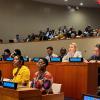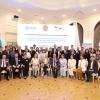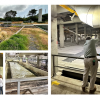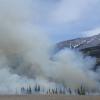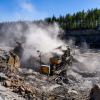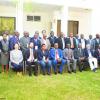News
Displaying Results 1 - 25 of 172
The Principles and Actionable Recommendations for Critical Energy Transition Minerals (CETM) developed by the UN Secretary-General’s Panel set a clear mandate for a global transformation in resource governance.
As Clovis Freire, Chief, Commodity Research and Analysis Section, at UNCTAD, emphasized…
While nitrogen is vital for plant growth, excessive and inefficient use of this nutrient means up to 80% of it leaks into the environment, mostly in various polluting forms of nitrogen: ammonia and nitrogen oxides, which are harmful air pollutants; nitrous oxide, a potent greenhouse gas; and…
Following the decision of Parties to the UNECE Convention on Long-range Transboundary Air Pollution (Air Convention) to revise the Protocol to Abate Acidification, Eutrophication and Ground-Level Ozone (Gothenburg Protocol), which is expected to further strengthen efforts to reduce air pollution in…
South Sudan, the world’s newest nation and a landlocked country in Eastern Central Africa, is situated in the middle of the basin of the Nile River, Africa’s longest river. Sharing significant transboundary wetlands, experiencing annual catastrophic floods and droughts and facing immense…
Taking part in the High-Level Political Forum on Sustainable Development in New York (8 – 17 July), UNECE Executive Secretary Tatiana Molcean presented UNECE regional perspectives on SDGs localization, climate action, energy, transport, water and engaged with civil society, youth, and the private…
Technological advances have brought down the C02 emission intensity of GDP in the UNECE region by 31% from 2010 to 2020. But progress on climate action remains far too slow. Each one of the past twelve months has been the hottest such month on record. The cost of extreme weather events, such as…
The shift towards the digital exchange of trade data and documents can improve efficiency, reduce costs, enhance transparency, and enable better accessibility to and analysis of data. Furthermore, it has the potential to foster greener and more inclusive trade. Yet, efforts to digitalize data and…
Mapping air pollutant emission sources in a country helps experts and decision-makers identify the most effective policies. Understanding the regional distribution of emissions is crucial for effective policy implementation.
Spatially allocating—or gridding—emissions is technically challenging.…
Zimbabwe, a landlocked country in Southern Africa, lies entirely within a total of five transboundary river basins (Buzi, Limpopo, Pungwe, Save and Zambezi) and one international lake (Kariba) while the number of transboundary aquifers is yet to be ascertained. These transboundary basins create…
Responding to the request of the Governing Council of the United Nations Special Programme for the Economies of Central Asia (SPECA), UNECE is building the capacity of public and private experts in the SPECA participating States to use the semantic standards and reference data models of the UN…
Representatives from countries across Central Asia and experts on the climate and clean air came together in Astana, Kazakhstan this week (11-13 June 2024) for the Sub-Regional Workshop on Integrated Planning for Climate and Air organized by the UNEP-convened Climate and Clean Air Coalition (CCAC)…
Mediterranean countries come together to increase climate resilience of water and sanitation sectors
The Mediterranean region is warming 20% faster than the global average and for every 1-degree global temperature increase, it would warm up by at least 1.5-2 degrees. This is severely impacting water and sanitation and the health and well-being of the region’s population. According to the World…
In a ground-breaking decision in December 2023, Parties to the UNECE Convention on Long-range Transboundary Air Pollution (Air Convention) agreed to revise the Protocol to Abate Acidification, Eutrophication and Ground-Level Ozone, as amended in 2012 (Gothenburg Protocol), which is expected to…
In an important move to secure the supply of essential raw materials, the European Critical Raw Materials Act (CRMA) entered into force on 23 May 2024. This legislation is a cornerstone in enhancing the EU's capabilities in sourcing, processing, and recycling critical raw materials (CRMs), which…
Addressing ministers at the 2024 International Transport Forum Summit (ITF24) in Leipzig, UNECE Executive Secretary Tatiana Molcean recalled that 152 United Nations Member States are contracting parties to at least one of the 61 transport conventions hosted by UNECE. These legal instruments help to…
Extreme weather events exacerbated by climate change increasingly threaten the ability of countries worldwide, including those in the UNECE region, to sustain safe, reliable, and equitable transport and mobility.
Adapting to future impacts of climate change is therefore no longer a concern to be…
In the face of global crises, progressing towards Sustainable Development Goal (SDG) 16—promoting peaceful, inclusive societies, justice for all, and accountable institutions—is a cross-cutting enabler for the 2030 Agenda. SDG16 intertwines with the other SDGs, underscoring the importance of…
With its strong mining industry, mountainous areas and high seismic hazards, prevention and preparedness for disasters and climate change adaptation are high on Tajikistan’s agenda. In particular, the increasing frequency and severity of weather events due to climate change can undermine the safety…
The technology associated with low-cost sensors (LCS) to monitor air quality has seen rapid developments over the past few years. While their use becomes more widespread and some are promoting them as silver bullet for air pollution science and control, experts have advised caution.
It is clear…
Ecosystems are highly sensitive to air pollution. To sharpen emissions reductions measures under the UNECE Convention on Long-Range Transboundary Air Pollution, expert groups have started scientific and technical work to support decision-making in the context of the process to revise the Protocol…
As the climate warms, wildfires are becoming more frequent. Parts of Southern Europe, such as Spain and Greece, have already seen their first wildfires of the season, with devastating impacts on local ecosystems and biodiversity. Wildfires, however, also have major impacts on global and regional…
UNECE Resource Management Week 2024 spotlighted the growing roles of the United Nations Framework Classification for Resources (UNFC) and the United Nations Resource Management System (UNRMS) in promoting sustainable development through enhanced integration and effective management of natural…
Iraq grapples with severe water challenges exacerbated by climate change, population growth, upstream dam construction, and decades of conflict and instability. The Euphrates and Tigris rivers, vital lifelines for the region’s agriculture, ecosystems, and communities, face increasing threats from…
The Water Convention has facilitated the First round of Technical & Planning Negotiations of the Draft ‘Agreement on the Establishment of the Luapula River and Lake Mweru Authority between the Democratic Republic of Congo (DRC) and Zambia on 18 and 19 April, concerning the transboundary Lake…
In today’s world of resource scarcity and the triple planetary crises of climate change, nature loss and pollution, many efforts are focused on developing new technologies, tools, products, and services that foster circular and sustainable consumption and production patterns across the textile,…






